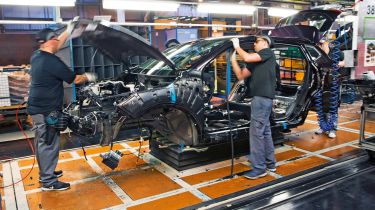Brexit offers “no advantages” for UK carmakers, warn MPs
Select Committee highlights difficulties surrounding trade tariffs, vehicle type approval and jobs if no post-Brexit trade deal is reached

A group of MPs has warned Brexit offers “no advantages” to the UK automotive sector, and called trade negotiations “an exercise in damage limitation”.
A report from the Business, Energy and Industrial Strategy (BEIS) Committee, a cross-party select committee comprised of 11 MPs, highlights difficulties surrounding trade, regulatory approval, and the free movement of EU workers.
If the UK leaves the EU without having agreed a set of individual trade arrangements, World Trade Organisation (WTO) tariffs of 10 per cent would be applied to cars. This, the report says, would mean “an average £15,000 vehicle would cost around £16,500” so “the current profit margin of around £450 on a £15,000 car would be comfortably wiped out”. The UK currently exports just under 80 per cent of its cars, 56 per cent of which go to EU countries.
• UK car industry faces 13% rise in costs after Brexit
While arguments have previously been made that leaving the EU would free the UK to negotiate advantageous trade deals with individual countries, the report’s authors consider that: “The UK cannot expect an expansion of trade overseas to outweigh the loss of trade to Europe arising from a hard Brexit”, adding that hitherto: “Membership of the EU has not been a barrier to expansion into overseas markets”.
Addressing the approval process – where new cars are assessed to ensure they meet regulatory requirements – the committee considers that “we have not identified any potential benefits from divergence from the EU, only costs.” This comes as a previous EU report found the UK’s Vehicle Certification Agency (VCA), which is currently able to certify cars for sale across the EU, would lose its EU-wide powers if no specific post-Brexit agreements are reached.
Jobs were another major concern highlighted by the BEIS committee. Between 7 and 10 per cent of workers in the automotive sector are EU nationals, and the industry currently has a skills shortage, with 5,000 unfilled roles.
The BEIS says “the shortage of UK engineers is well established”, adding that an end to the freedom of movement currently enjoyed by EU workers, or a “leakage of skilled Europeans”, could pose further employment difficulties in the post-Brexit future.
Carmakers directly and indirectly employ around 900,000 people in the UK, and are responsible for almost a tenth of all manufacturing,
Motor industry calls for ‘frictionless’ Brexit
The UK’s automotive industry has previously called on the Government to speed up the Brexit ‘transition period’ negotiations in order to guarantee growth and productivity.
Tony Walker, president of the Society of Motor Manufacturers and Traders (SMMT), said a no-deal Brexit represents “a real threat” to the UK automotive sector – an industry that directly employs 169,000 people and accounts for 13 per cent of the UK’s export goods.
The Government has agreed to negotiate a transition period between the Brexit deadline and the UK’s departure from the EU, but the SMMT says this needs faster, more concrete progress.
• ‘No deal’ Brexit could see 10 per cent added to cost of German cars
Were the UK to leave the EU without a deal, at least £4.5 billion would be added to UK automotive industry overheads due to World Trade Organisation (WTO) tariffs.

Addressing the audience at the 101st SMMT annual dinner, which was opened by comedienne Jennifer Saunders and briefly interrupted by protestors voicing anger at ‘toxic’ cars, Walker highlighted membership of the EU currently means the majority of the 1,100 lorries and trucks that enter the UK every day from the continent to supply car plants and factories are able to do so through frictionless borders without customs checks.
Walker said that: “After all the difficulties we have overcome, all the changes we have made and the innovations we have brought, we do not need trade barriers to be our next challenge.” He said while the Government recognised the need for a post-Brexit transition period, “we need to see concrete progress – and quickly”, adding the transition period “should be on the current terms and, crucially, not time-limited” in order for the industry to adjust and secure investment decisions.
Turning to recent controversy over diesel emissions, Walker explained that: “Consumer confidence has fallen leading to a downturn in sales. Uncertainty about Brexit – and market confusion over diesel – are taking their toll.”
The SMMT president said the automotive industry has “invested billions of pounds in clean, low emission technologies” and that “the latest Euro 6 vehicles…should not be unfairly penalised in Government plans.”
What effect do you think Brexit will have on the UK car industry? Tell us in the comments section below...



